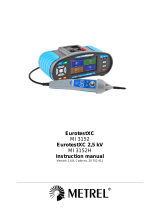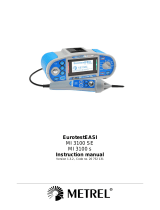MI 2166 Demonstration board Table of contents
3
1. Introduction ............................................................................................................... 4
1.1. General Description ............................................................................................. 4
1.2. General warnings ................................................................................................. 4
1.3. Meaning of warning/information symbols on front panel ...................................... 4
1.4. List of measurements that can be demonstrated ................................................. 5
2. Before connecting demonstration board to mains supply ................................... 5
3. Front panel description ............................................................................................ 6
4. Faults simulation ...................................................................................................... 6
5. Measurements........................................................................................................... 7
5.1. Continuity of protective conductor ........................................................................ 7
5.2. Insulation Resistance ........................................................................................... 8
5.3. Earth resistance ................................................................................................... 9
5.4. Earth resistance using two-clamp method ......................................................... 11
5.5. Specific earth resistance .................................................................................... 12
5.6. Line impedance .................................................................................................. 12
5.7. Loop impedance ................................................................................................. 13
5.8. Contact voltage and trip-out time / Current of RCD1 protection device .............. 14
5.9. Current measurement using clamps .................................................................. 14
6. Technical data ......................................................................................................... 16
7. Maintenance ............................................................................................................ 16
7.1. Cleaning ............................................................................................................. 16
7.2. Service ............................................................................................................... 16
8. Standard set ............................................................................................................ 17


























